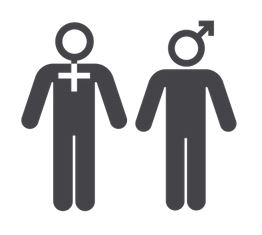
The difference between men and women’s brains has been a hot topic throughout the ages. Studies showing that one gender is better at certain mental tasks than the other (eg. spatial awareness), is often attributed to biological underpinnings; that men and women’s brains are hard-wired differently.


A recent research study1 has found that there is in fact no categorical difference between male and female brains. While there are some features that are more common in females and other features in males, overall one cannot categorise a person as having a “female brain” or a “male brain”. The researchers analysed fMRI scans of 1400 human brains and found major overlap in brain structure between the two genders. If one was to, for example, look at a brain scan to try and determine the gender of the person, one wouldn’t be able to so with certainty; each brain is individual.
“We show there are differences, but brains do not come in male and female forms. The differences you see are differences between averages. Each one of us is a unique mosaic.” says lead author Daphna Joel2.
The finding that each of us has a unique, individual brain has important social implications. Whether you’re male or female, your gender doesn’t predict what traits you might have, or how you might behave. Individuality and diversity shows that it is important to treat all people as individuals, rather than belonging to a certain category.
References:
